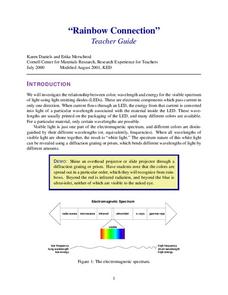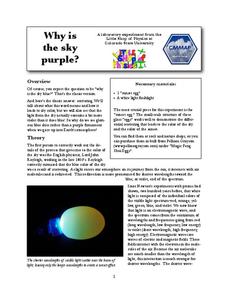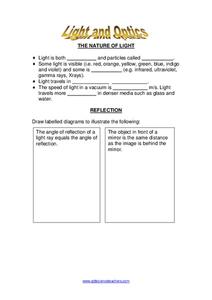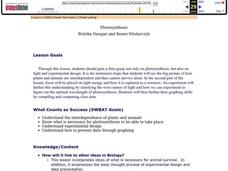Cornell University
LEDs Rainbow Connection
View LED lights through the eyes of a scientist. Young scholars learn to view light as a wave frequency and connect various frequencies to different colors on the light spectrum. A lab activity asks groups to measure the frequency of...
Colorado State University
Why Are Clouds White?
Is it possible to change the color of clouds? A three-part activity explores the scattering of light by the water droplets that make up clouds. After observing a demonstration, curious scholars conduct their own investigations of the...
Colorado State University
Why Is the Sky Purple?
The color of the sky depends on the time of day. Young scholars experiment with scattering different wavelengths of light to recreate the color of the sky. They observe both the longer blue wavelengths and the shorter red and orange...
Curated OER
Light 2: The Lighter Side of Color
Middle schoolers explore light and color, including how colors are mixed to produce new colors, how light is filtered, and how light is reflected off of surfaces.
Curated OER
Light and Optics
In this science worksheet, students look for the words to fill in the crossword puzzle that is focused upon the concepts of light and optics.
Curated OER
Light and Optics
In this light and optics worksheet, 11th graders fill in 7 blanks about the nature of light, draw 9 diagrams to illustrate reflection, refraction, lenses and color.
Cornell University
Spectral Analysis with DVDs and CDs
Build a spectrometer to analyze properties of light. Scholars examine the spectrum from CDs and DVDs from two different light sources. Using the spectrum, they work to identify different elements.
Cornell University
Diffraction Demystified
Study diffraction patterns using CDs and DVDs! Scholars measure the diffraction patterns of a light wave as it hits a CD or DVD. Using the information, they can measure the distance between the tracks.
Teach Engineering
Thirsty for Gold
In the last portion of the six-part unit, teams perform an experiment with gold nanoparticles to determine which sport drink has the most electrolytes. The nanoparticles are used as chemical sensors and fluoresce in different wavelengths...
International Technology Education Association
Singin' the Black and Blues
How does the color of the sky change from blue to reds and oranges to black? An illuminating lesson explains how light travels through different mediums using the sun's light as an example. By examining diagrams and illustrations, pupils...
Teach Engineering
Designing a Spectroscopy Mission
In this mind-bending activity, young engineers explore this question of whether or not light actually bends. Using holographic diffraction gratings, groups design and build a spectrograph. The groups then move on research a problem...
National Nanotechnology Infrastructure Network
Understanding Wave Motion - Slinky vs. Snaky: Which Spring is Dominant?
Ride the wave to an understanding of refraction! The first in a series of two inquiry-based lessons challenges learners to create transverse waves with two different types of springs. As their wave hits an object, they observe the change...
Curated OER
How to verify the relationship between the wavelength and frequency of light
Students collaborate in heterogeneous groups with each student having a different role. They comprehend the relationship between the frequency and wavelength of light. They record their observations in a table that is included on this...
Curated OER
Properties of Light
In this light waves worksheet, students will measure the wavelength of different light waves and then calculate its frequency. This worksheet has 9 short answer questions and 10 fill in the blank questions.
Curated OER
Light & Crystals
Students observe a demonstration of light refraction. They experiment with disappearing crystals to further study light refraction.
Curated OER
Understanding Light: Lesson 2 - The Electromagnetic Spectrum
Students investigate the Electromagnetic Spectrum and realize there is energy beyond visible light. They identify parts of the EM Spectrum.
Curated OER
Electromagnetic Spectrum Worksheet
These six multiple-choice questions ask pupils to evaluate the energy, wavelength, and frequency of particular electromagnetic wavelengths. Further questions then require them to apply their knowledge and convert certain values or give...
Curated OER
Now You See Me, Now You Don't
Bioluminescence fascinates most upper elementary scientists. Display images of different glowing deep-sea organisms and discuss their environment. Young biologists then experiment with images and different colors of filtered light. In...
Curated OER
The Sun's Energy
Sixth graders examine how the sun's energy arrives as light with a range of wavelengths. They discuss the characteristics of light, examine the color of light using a spectroscope, and conduct an experiment using water and thermometers....
Curated OER
Catch a Wave. . .
Part of a larger online space science website, this page has a brief explanation of electromagnetic radiation and a chart of wavelengths as compared to common objects. There are four questions to answer about the information. This can be...
Curated OER
Photosynthesis
Students recognize the importance of plants as they perform an experiment involving photosynthesis. Students determine the optimum wavelength of light for photosynthesis by exposing plants to different colors of light, collecting data,...
Physics Classroom
Color Pigments
Objects contain pigments that selectively absorb a wavelength of light, and our eyes only observe a very small range of these wavelengths. Scholars apply these two facts to three different activities. They identify the pigment in an...
Physics Classroom
Spectrum
Scholars relate each of the colors in the spectrum, except indigo, by comparing their frequencies, wavelengths, and energy levels. Then, they compare each section of the electromagnetic spectrum when considering the same three variables.
Curated OER
Solar Electricity ~ The Colour Sensitivity of a Photovoltaic Cell
Teacher's notes, a materials list, detailed procedure, tips, and extension ideas are all included to make teaching this instructional activity on photovoltaic cells a sunny spot in your day! After some brief background reading, physical...























